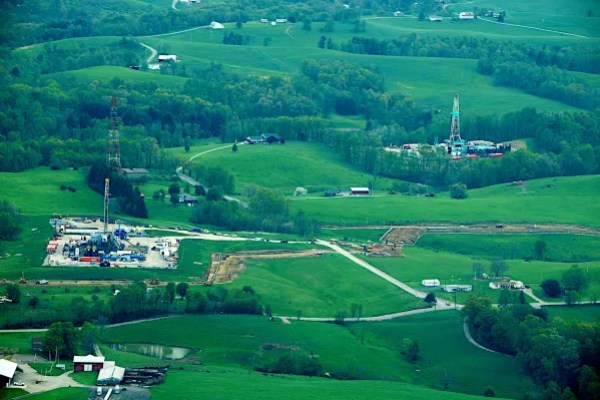
Suppose you own a property that sits atop a natural gas deposit, but you don’t want to sign a drilling lease and your neighbors do. Can they force you to go along?
In most states, the answer is “yes.”
ENN reporter Kathiann Kowalski has a story out today about unitization, in which a landowner can be required to allow oil and gas extraction from their property if a certain percentage of their neighbors sign leases voluntarily. Oil and gas companies are increasingly exercising the option in Ohio, enabled in part by recent legislative reforms to streamline the process.
Rob Brundrett, president of the Ohio Oil and Gas Association, explains that the process exists “so that a small minority of owners … cannot stop everyone else from realizing the full potential of their property and minerals.”
But if you want to realize the full potential of your property by leasing it out for a wind farm or a utility-scale solar project, things are a little different.
Among numerous efforts by Ohio lawmakers in recent years to restrict clean energy, a law passed in 2022, SB 52, gives counties the authority to block wind and solar projects, or ban them outright. It does not apply to fossil fuels.
In a recent high-profile solar case also covered by Kowalski, landowners said solar opponents are depriving them of their right to utilize their property – similar to the argument used to justify unitization.
“I have rights as an owner, farmer and investor that shouldn’t be limited by a small group of individuals who are opposed to any solar development,” said Richard Piar, one of the landowners in support of the project.
Of course there are important distinctions. Oil and gas activity is mostly underground, but carries real environmental risks; while a solar array is visible to all, with risks that are mostly fictional. And for generations, energy facilities that actually cause pollution have been built in poor and BIPOC communities without regard for the impact on neighbors. Recent debates over pipelines, carbon capture projects, and even batteries have focused on property rights and environmental and health risks.
These kinds of disputes are only going to become more common as the country moves away from centralized power plants to a more distributed energy system, with a patchwork of state and local rules likely to follow.
— Ken Paulman
More clean energy news
⚡ High voltage: A new order from the Federal Energy Regulatory Commission will require grid operators to plan for a massive transmission buildout to support renewable energy, but critics say the rule infringes on state authority and could be subject to legal challenge. (Canary Media)
💲 Pay now, pay later? A Wisconsin utility is asking state regulators for permission to bill ratepayers more than $2 billion to build two new gas power plants, a fuel storage facility, and a pipeline, drawing pushback from groups that say the investments are likely to be obsolete before mid-century. (Energy News Network)
🏭 Repurposing power plants: Stalled efforts to redevelop a former coal plant property in Indiana reflect a broader struggle for local officials who face legal obstacles when seeking to repurpose contaminated power plant sites. (Inside Climate News)
🔬Accelerating hydrogen: The U.S. Energy Department aims to cut the price of clean hydrogen, electrolyzer systems, and other pieces of the hydrogen industry through several years of research and development. (Utility Dive)
👨🍳 Hot in the kitchen: California lawmakers advance legislation that would require labels on all new natural gas stoves warning customers of potential health hazards resulting from the appliances’ emissions. (Associated Press)
🔌 Demand response? Michigan lawmakers are split over whether to provide new tax incentives for large data centers that critics say would drive up electricity demand and disrupt the state’s climate efforts; meanwhile, an Ohio utility asks state regulators for new rate structures that would require data centers and cryptocurrency mining facilities to commit to long-term purchase agreements. (Bridge, Columbus Dispatch)
🏠 Climate impacts hit close to home: Climate change has wreaked havoc on home insurance, with companies seeing losses and either substantially raising rates or withdrawing coverage altogether across a growing swath of the country. (New York Times)
📢 We want to hear from you! Send us your questions, comments, and story tips by replying to this email.
💸 Support our work: The Energy News Network is powered by support from readers like you. If you like Energy News Weekly, share it with a friend! Or give today and help us keep our news open and accessible for all.
📧 Want more energy news? Sign up for our daily digests.
